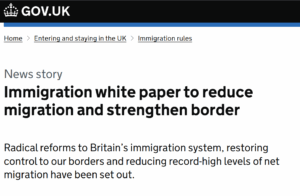(news and opinion)
The 2024 UK elections was 60.0%, down from 67.5% in 2019. The second lowest turnout at a UK general election since the introduction of universal suffrage in 1928, with only the 2001 election recording a lower turnout (59.4%). Public dissolusionment seems worldwide to result in less active voters. Only a few countries like Australia, Argentina, Belgium and Luxembourg have compulsory voting in place. When world economics aren’t great, people feel dissilusioned in politics, this arguably creates the rise of the more extreme politics. Perhaps because those voters are more gunning for change?
However, still enduring the effects of the Brexit fiasco, it was this time Labour who won the vote. But not by just promoting their usual agenda. As elsewhere in the world they saw the need to attract more voters who veered to the right, with the dillema of not losing those on the left. Well they did it and won, and now they need to evidence themselves to the voters and public. So, instead of a more fair and working immigration system that could also keep undesirables out, they went with the hype of showing how tough they can be. The trend (also elsewhere in the world) is worrying.

Even though in name the new UK government is more liberal it is like politicians elswhere in the world giving into more restrictive immigration controls. Like the US Electronic System for Travel Authorization (ESTA) (2008) the UK has since 02 April 2025 started the so called ETA, Electronic Travel Authorisation. The US started this trend following 9/11 (2001 terror attacks) and the resulting 9/11 Commission Act of 2007.
To be fair the UK ETA was already in March 2023 in the works. Perhaps as a tool by the previous government to appeal to certain voters. So, before the 2024 elections, but Labour did not pull the plug on it. As said, the world is becoming more nationalistic and xenophobic and politicans everywhere are following the trend. The European Union is working on the final steps of a similar system (ETIAS) which was first proposed in 2016. So, the UK is quicker in implementation but not the only one.
The End of Visa Free Travel
Previously I followed the wording and explanations behind these systems and didn’t call these visas. But let’s be honest. This is indirectly the cancellation of visa-free travel. The new systems may not be called visas, but work exactly the same. Even though in a more modern electronic jacket. The vetting of these new type of visas is perhaps a bit more low key, less restrictive and a tool to get revenues in. But ultimately we can’t escape the conclusion that they are in fact visas, and this is thus the end of real visa-free travel. If you had a so called strong passport from certain developped countries than you are now a bit less better of, but still much better of than those who still need to joing physical queues and are often asked to evidence the impossible.
UK Citizenship Laws
Back to the UK. Our colleague John, specialist British immigration sollicitor/lawyer, advised on the anounced changes. For naturalisation he stated “Life in the UK test to be refreshed. Hooray.” But also, “Route to settlement and citizenship will be doubled from 5 to 10 years, with a suggestion that positive points-based factors can reduce this time. Unclear if there will be transitional provisions.” The UK and the Netherlands often find inspiration between themselves. The Netherlands is also considering (2023) a change from 5 to 10 years for naturalisation. This has yet to become law but could become law this or next year. The more scientific reasoning that this mostly discourages integration is something that is largely ignored, although the UK points based system may sort of address that. Depending on how points are calculated.
UK Immigration
My colleague John further reports a ban on overseas care worker recruitment. Limitations to renew such sponsorship after 2028. Work visas will be restricted to occupations requiring a degree. The salary thresholds for sponsorship will rise (again) to ???. A new “Temporary Shortage List” allow recruitment in certain (as yet unspecified) occupations. “The awful Innovator Founder visa for entrepreneurs will be reviewed.” The graduate visa duration will be reduced to 18 months. A possible introduction of a Government levy on higher education provider’s income from international students. The universities are already struggling with previous challenges and a drop in international students. And last but not least parliament may legislate on Article 8 proportionality assessments, to try and decrease the number of visas granted on human rights grounds and make it harder for claims to be established (again).
Worldwide Trend
As I wrote, the UK is following a worldwide trend. The USA is an extreme example as it does not only see restrictive laws, but government and (ICE/FBI) actions against migrants and foreigners which are contrary to its own laws and constitution. I hope that this madness will be rectified due time, but that doesn’t mean other restrictive changes aren implemented. And certainly, other countries are less controversial in how they change and implement their laws (at least most follow their laws and constitution), but the changes to the laws can be just as restrictive, targeted, and callous. In most cases the restrictive measures are contrary to more scientific approaches to immigration.
When the world was economically doing well we saw a growth in modern, liberal and fair laws with respect to immigration and nationality/citizenship. The EU Freedom of Movement principles are a beautiful example of how minimal restrictions can work. Freedom to move, with family, if employed, studying or self sufficient, and you can’t become a burden or threat to the host country.
However, as economics worldwide are struggling and conflicts are growing, we see a move to more restrictive policies. Brazil is considering requiring its e-Visa for Australian, Canadina and US business visitors. (Upcoming) Immigration restrictions are reported in amongst others the Netherlands, Azerbaijan, Italy, the Czech Republic, Philippines, Canada, Hungary, Austria, Finland, and Türkiye. Japan and Hong Kong increased certain fees. The US, Canada and UK are doing more checks on migrants and punish quicker. On the other hand some countries like New Zealand, Australia, Taiwan and Malaysia relaxed certain categories or added new migration possiblities. But overal it is a more restrictive trend. Therefore, if you have plans to move countries, or get a nationality/citizenship, then perhaps don’t wait too long.
Written (as news and opinion) by
Kris von Habsburg
Specialist Dutch Nationality Lawyer (jurist)
Proudly European, Dutch, Australian and British.
